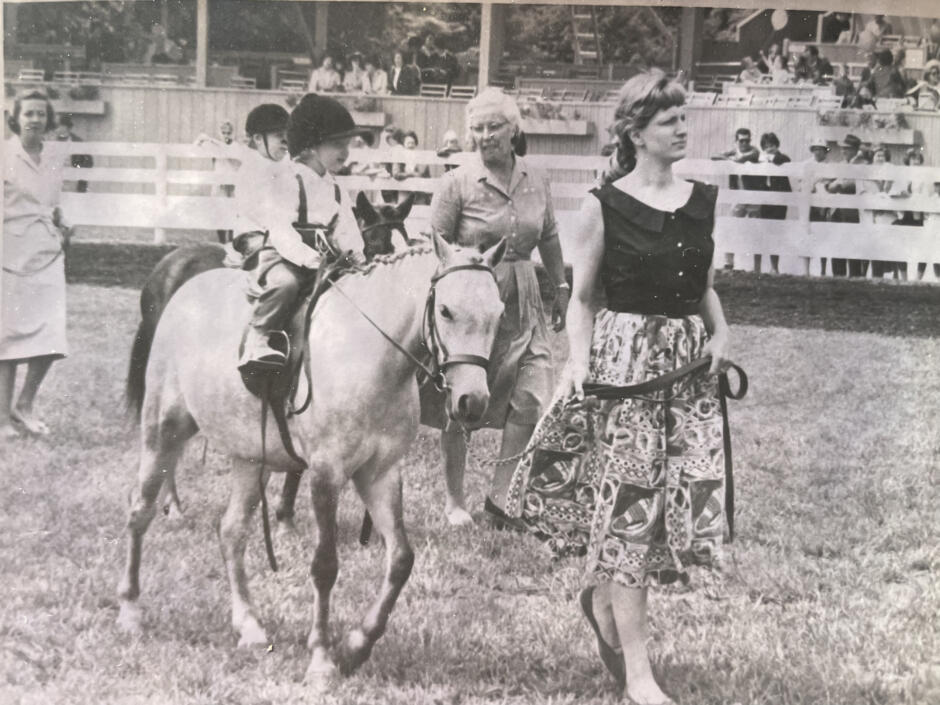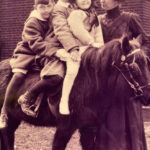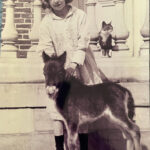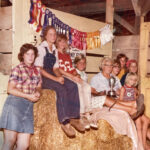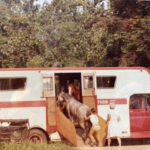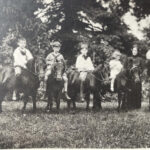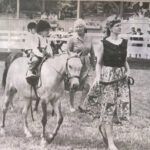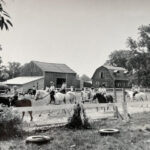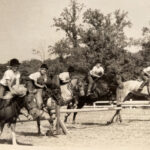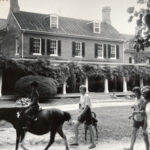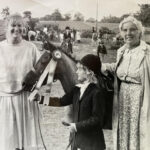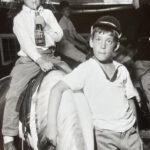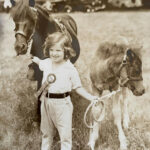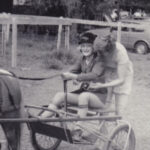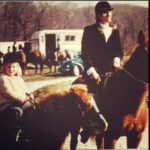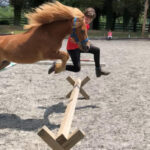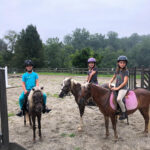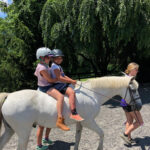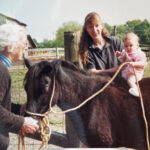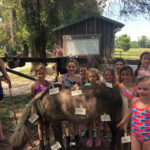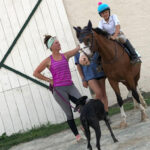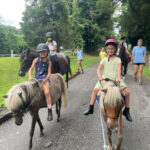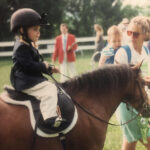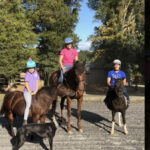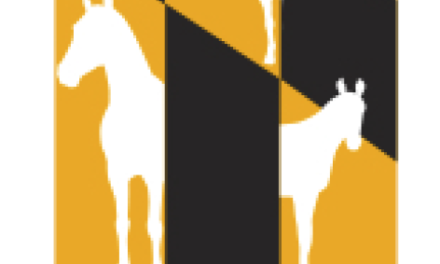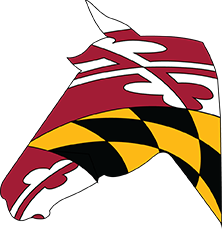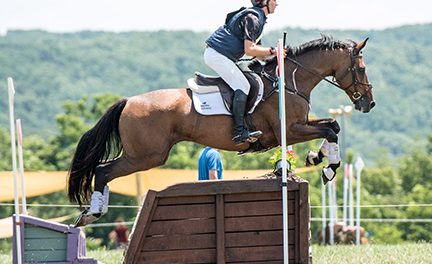By Katherine O. Rizzo (first published in the June 2023 Equiery)
We at the Equiery like to say that Maryland is horse country, and it really is true. We have more than 400 lesson barns licensed by the state and they cater to all disciplines and levels of riders, from the beginner levels to the international levels. Some focus on one discipline while others focus on several.
Many of our lesson stables are fixtures on the equestrian scene and have raised generations of riders. But none has seen more generations of Maryland riders than Olney Farm in Joppa, which can trace its roots all the way back to the 1700s.
The property was originally patented, in 1705, as “Prospect” and was purchased by the Shriver-Howard family in 1855. “The first home [around 1705] was four stories tall and built over a creek,” current owner Ami Howard said. “It was mainly just one room on each floor and probably used more as a meeting house than an actual home.” The first brick house on the property was built in 1720 and portions of it still stand today as the main house.
In 1855, the Shriver-Howard family established a large dairy farm on the property and grew hay. It has remained in the family since then, adapting over the years to diversify and grow. J. Alexis Shriver (1872-1951), an amateur scientist who introduced several agricultural advancements to Harford County including the use of electricity in farm work, was responsible for much of the work on the property at that time. He also wrote pamphlets on agricultural subjects for the U.S. Commerce Department and published research on Maryland local history and historic preservation matters. His wife Hallie Shriver taught their children to ride including their daughter Harriet, who started breeding Shetland Ponies at the farm in 1920.
Soon enough, she was teaching lessons on these homebreds out of a barn she built from the remains of the dairy barn, which had been lost to a fire. Teaching at Olney Farm continues to be a family affair with Harriet’s granddaughters Kate Perri and Patti Fenwick both teaching there. Great-granddaughters Lia McGuirk Kelly and Sophie Perri also spent some time as instructors at Olney Farm before moving on to other pursuits.
The Olney Farm ponies were popular among students from the beginning of the breeding program, with Harriet taking students to local shows as well as the Maryland State Fair each year. “Getting the ponies to the fair was an adventure for sure!” Ami said. “They didn’t have a horse trailer so the kids would walk the ponies all the way to Timonium. My mother-in-law would find places for them to stay along the way to and from the fair.”
Ami, who grew up in Towson, married into the family in the 1950s. “I was a bit more active in competing at the time and that’s when we started breeding our own competition horses too,” she said. The Olney Farm lines started with two “drafty” mares named Emmy Lou and Josie. “It turns out they were by an imported German stallion that stood in Maryland in the 1940s,” she said. “This was before German horses really got popular in the states.” Ami bred these mares to mainly Thoroughbreds and produced and competed several top event horses.
One of the farm’s most successful homebreds was Olney Zoe, who was featured on the cover of the March 2020 Equiery after her death at 33 years old. Zoe, a Trakehner/Thoroughbred cross was a fifth generation mare through Olney Farm’s breeding program. She was by the Trakehner stallion Zauberklang and out of the Thoroughbred mare Amanda. As a yearling, Zoe was eighth out of nearly 50 entries when shown in hand at Dressage at Devon and then as an upper level event horse, Zoe earned U.S. Eventing Association’s Mare of the Year title in 2000 with Ami’s coach Gayle Molander in the irons. She competed through the Advanced level in eventing. She was retired from eventing due to a knee injury, but in 2019 Ami hopped back on board to complete a Dressage Century Ride with their combined ages being 120. You can read more about Olney Zoe on equiery.com.
The sixth generation of the family lives on the property today and offers boarding, lessons, and summer camps, and hosts local and rated competitions. The farm still has an active breeding program, particularly the Olney Farm Shetlands who are seen often on the pony racing circuit. It is the lesson and camp program, however, that sustains the farm financially. “We have four instructors and a lot of great kids,” Ami said. “We run three summer camps that always fill by February each year, and our waitlist for lessons is huge right now.”
The summer camps at Olney Farm differ from others because they offer a “Farm Camp” as well as more traditional eventing camp. “I love the farm camp!” Ami said. “The kids tend to be very young and learn all about a working farm.” She explained that they learn about caring for livestock such as sheep, pigs and chickens, as well as working with the foals and other horses at the farm. “They of course get to ride too but the focus is on farm life, not just riding,” Ami added.
The focus in the eventing camp, on the other hand, is on the basics of the sport and developing riders correctly at the lower levels. “Those kids mainly are competing at baby beginner novice but the level doesn’t matter, they have fun learning about the sport,” she said.
Many of these kids go on to ride in the farm’s annual starter horse trials. “I love hosting the starter event,” Ami said. “It is less hassle [than a recognized event] and really the level our clients want.” In addition, the farm hosts a U.S. Eventing Association horse trials each summer for Beginner Novice through Preliminary levels. “We started by offering little shows for our students but then it just grew from there,” Ami explained. “We did hunters for a while but there are just too many classes!”
Ami started building her own cross-country course based on the courses she was riding as a competitor. At that point the farm got more involved with the USEA. “I really like the expertise that the USEA and USEF officials bring to our courses,” she said. The farm also hosts Maryland Dressage Association shows as well as fun schooling shows for its lesson students and boarders.
For Ami, it is the lesson program that she enjoys most. “I really keep the program going because of the kids,” she said. “I grew up not having ponies in my back yard and I want to keep connecting kids with ponies and see them have this great experience.” She added with a laugh, “there is nothing cuter than seeing a four year old kid learn how to pick out a hoof of a Shetland Pony!”
- Hallie Shriver introduced her children, including Harriet, to riding at an early age on the farm.
- Harriet Rogers with her brothers and friends outside the main house at Olney Farm in 1923 before walking ponies to the Maryland State Fair in Timonium.
- Harriet Rogers with one of Olney Farm’s ponies.
- Lisa Mathis, Jane Chell, John Dallam, Daisy Deeley, Harriet Rogers, Kate Perri, Pete Dallam and Tarry McGuirk at the Maryland State Fair.
- Harriet Rogers talking to parents and students at Olney Farm.
- Loading ponies for a show in the 1960s
- Hallie Shriver and J. Alexis Shriver with their children.
- Ami Howard with her daughter Patti at the Devon Horse Show.
- Pony Camp in the 1960s
- Terry McGuirk, Patti Fenwick, Lisa Mathis, Kathy Demme, Dave Demme in 1965
- Early pony camp
- Three generations of Olney Farm instructors, from left: Ami Howard, Patti Fenwick and Harriet Rogers.
- Frances Flatau with Kathy Demme at Devon
- Lisa Mathis and Dave Demme at the Joppa Magnolia Show at Olney Farm
- Frances Flatau
- Ami Howard in 1978
- Ami Howard foxhunting with her daughter Kate
- Shetland Camp student
- Shetland Camp students
- Camp kids with lesson pony Smokey.
- There is a family tradition at Olney Farm where each generation gets their first pony ride at 6 months old. Here is Terry McGuirk with Lia Kelly.
- Pony Camp continues to be a popular aspect of Olney Farm!
- Lia McGuirk Kelly with Sophie Perri
- Emmy McGuirk and a group of lesson students heading out for a bareback pony ride.
- Tarry McGuirk with Lia Kelly
- More Olney Farm photos and history!
- Sophie Perri, Lia McGuirk Kelly (riding homebred Tequila Sonrise) and Alberto Delgado.

